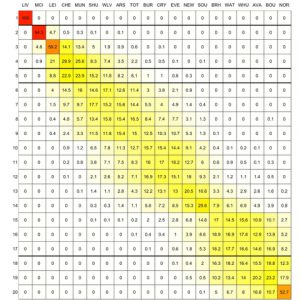The abrupt halt on live sport has left a void in many people’s lives. With the football season currently unfinished, CONNECTED speaks to Reading’s Dr James Reade to find out what the final score might have been.
Dr Reade from the Department of Economics has a passion for researching economic behaviour in sport. While the Premier League has been paused with 92 football matches left to play in the 2019/20 season, Dr Reade is using his economic modelling expertise to predict what the final scores might look like.

He tells CONNECTED: “There is so much uncertainty around football and all other live sport at the moment. Will league seasons and competitions be completed or shortened? Will champions, qualification, promotion and relegation be determined fairly on the pitch, or by some statistical equation? Will games resume without spectators? None of the answers to these questions are clear.
“In an ideal world, all matches would be played, results logged and final tables computed, with all the outcomes playing out as if there was no delay. In reality, there are significant constraints on this happening. The UEFA Euro 2020 Championship, due to be held this summer, has already been moved to 2021, removing one such constraint. But teams have also highlighted the thorny issue of many of their players’ contracts expiring at the end of June or July. The conventional start of the 2020/21 European football season in August is also threatened.”
Statistical modelling
Dr Reade points out that other sports, such as cricket, have long used statistical approaches to deal with external forces restricting play, such as weather. For example, the Duckworth-Lewis-Stern method is applied in cricket to try and ensure there is still a winner.
Dr Reade explains: “This statistical approach factors in the remaining resources of each team, in terms of their batsmen not yet out and the number of balls yet to be bowled after any delay, to set a revised winning target for the chasing team.
“Such an approach could be taken with football, even down to generating the exact score lines of games that were never played, using statistical modelling.”
The best methods to model and forecast score lines have been extensively researched, and Dr Reade suggests that simulation methods can be employed to project outcomes to the end of league seasons, based on all the play that has come before.
Predicting the final score
Using one common approach, Dr Reade and his team at Reading have produced a set of outcome probabilities for the end of this season’s English Premier League, based on all the play that came before the suspension.

Dr Reade explains: “We have made a heat map to show the likelihood of different outcomes. Cells go from white [no chance], through yellow and orange to red. The redder a cell, the more likely that that team finishes there.
“If you look at the predicted results next to the current league tables, you can see that some things are obvious and confirmed. In all likelihood, by our statistical model Liverpool will win the Premier League with Manchester City coming second and Leicester City third.
“The only predicted differences to the current top 10 are Sheffield United and Wolverhampton Wanderers swapping places, and Arsenal and Tottenham Hotspurs also swapping places.”
When it comes to the relegation zone, Dr Reade predicts that it will still be Aston Villa, Bournemouth and Norwich who get relegated although in a slightly different order. He also predicts that in the bottom 10, Watford and West Ham will swap places, but avoid relegation.
Is modelling the answer?
Dr Reade explains that while there is a lot to be said for modelling, sport, like the economy, is all about people making decisions, and those decisions impact on outcomes. Therefore we cannot be sure that these predicted results would definitely reflect what might actually happen.
Dr Reade adds: “Qualification for the European competitions and who gets relegated has huge uncertainty. If league seasons do not play out in full, given the financial implications for individual teams of whatever decisions are made, then lengthy and expensive challenges in the law courts are sure to follow. There seems little alternative to playing out the remainder of the season.
“Even if matches do resume, but behind closed doors, then match outcomes could still be affected and not reflect what might have been the true result. Research suggests that referees favour the home team less behind closed doors. Our own research, updated to include the early weeks of the pandemic in Europe, supports this conclusion as well, showing that home advantage is almost completely removed, and away teams were awarded half a yellow card less when playing behind closed doors. We also found some evidence that away teams miss fewer penalties in empty stadiums.
“Both from a financial and a sporting perspective, it is difficult to find any clear argument for anything other than completing the current football season once the virus is sufficiently contained, whatever this means for future scheduling sacrifices.
“If necessary, the start of the next season should be postponed, possibly with fewer matches and with domestic cup competitions skipping a year.”
Find out more about Dr Reade’s research.
This article was first published in The Conversation on 27 March 2020.






